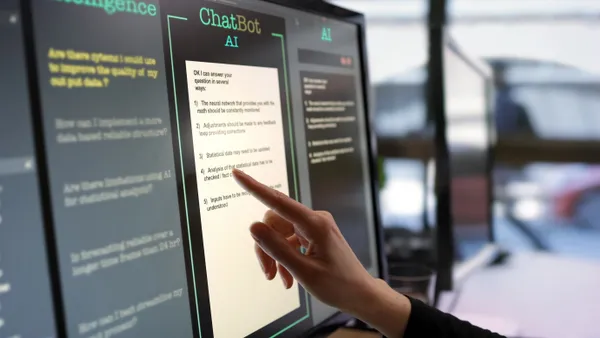Dive Brief:
- More than two-thirds customers report having had a bad chatbot experience, and another two-thirds have had a bad experience with an interactive voice response system, according to a survey of 1,500 consumers released by Verint last month.
- Among those customers using chatbots, the most common pain points were the chatbot’s inability to answer questions and its failure to understand the customer’s needs, each cited by more than two-thirds of respondents.
- About 3 in 5 customers had a bad experience with an IVR that took too many “press this number” prompts to get to an actual human, while more than half of customers cited frustration with an IVR that never actually routed them to a live agent.
Dive Insight:
Companies are embracing self-service, but live agents remain an important failsafe for when chatbots and IVR can’t meet a caller’s needs.
CX leaders aiming to eliminate friction between self-service and live assistance need to implement self-service with a focus on better experiences, particularly for generative AI-powered tools, according to Brian Cantor, principal analyst and director of CCW Digital.
Companies that roll out chatbots to save money, particularly by reducing their agent headcount or cutting back on training, are more likely to upset customers, according to Cantor. Automation can help CX leaders operate under tight budget constraints, but there can be a long-term cost.
“Customers still very much rely on live agents, and they see the loss of access to humans as one of the greatest pain points,” Cantor said during a webinar last week. “If bots are being added with those objectives in mind, then that's going to have a negative impact not only on this nebulous idea of humanity, but on the customer's satisfaction with that brand.”
If chatbots are being added to make self-service more personalized and relevant, then that can lead to better customer relationships, according to Cantor.
A smart chatbot implementation strategy can be a boon for agents as well.
As more issues are resolved in self-service, agents have more time to spend resolving complex inquiries or helping customers who aren’t comfortable with automation. Better chatbots can also lower the pressure on agents by reducing the number of calls they need to handle.










